An interesting microcosm of history, Salt essentially takes us back through the known history of the world, and analyzes how this humble little rock – the only rock humans can eat – and how it has had a transforming effect upon civilization. To be honest, however, there were large chunks of the book that weren’t terribly interesting, so I’d veer from jaw-aching boredom to total fascination. What I enjoyed the most were the snippets of specific cooking history – obviously – and the recipes utilizing salt as a preservative from ancient times.

I am not normally a fan of non-fiction, and about the only non-fiction books I’ve read recently or blogged about are food memoirs. I read to escape our sometimes-mundane existence, so the last thing I want is to be bogged down in lengthy details of reality. This book, however, took me on a journey spanning the globe and timeline of the world, from ancient Rome, where Roman soldiers were actually paid in salt, hence the term “worth his salt” to modern-day Cajun country where shellfish are salted and preserved.

Salting has been in use as a food preservative since time immemorial, which if you think about it, has a direct effect upon health, winning battles, and otherwise having a culture and society survive and flourish. It is believed to keep evil spirits away, and has been used in medicine to draw moisture and infection out of wounds.

The science of salt is dull, but not being a scientist or a linear thinker, that’s just me. I find salt interesting insofar as it spices up food, acts as a cleaning agent for my cast iron pans, and I also use it sprinkled across all of my doors and windows in my home to keep out negative energy and evil. Laugh if you want, but for me, it works.

Some of the more fascinating tidbits I learned from this book include: the fact that Gandhi’s famous march against the British was in protest of salt restrictions; one of the reasons why George Washington fought against the British was against salt shortages; that flamingos get their brilliant pink hue from salt; that salt in the oceans is what keeps our fish alive; that anchovies are the basis for Worchestershire sauce; and that without salt, we wouldn’t have things like soy sauce, cheese, preserved anchovies or preserved walnuts. Which would seriously suck, because not only are cheese, walnuts and anchovies among my favorite foods ever, but they also make up the base of today’s gastro-porn recipe, based on these two passages from the book.

Since the time of ancient Greece, anchovies have been the most praised salted fish of the Mediterranean, and since the Middle Ages those of Colliore have been regarded as the best salted anchovies in the world.
By the seventeenth century, the English had discovered that salted anchovies would melt into a sauce. This practice may have existed centuries earlier on the continent, but in the seventeenth and eighteenth centuries, anchovy sauces became extremely popular.

Not having been raised to eat anchovies, I didn’t try them until adulthood when I first made pasta alla puttanesca. I was hooked on these little salty nuggets of flavor from that day on. And for all those people who freak out over anchovies in their food, calm the f*ck down already. You can’t even taste the fish, it just gives a lovely, salty flavor. So get out of your comfort zone and eat an anchovy! Or make this recipe.

INGREDIENTS
1 cup chopped walnuts
1/4 cup olive oil
6-7 garlic cloves
8 anchovy fillets
1 lb. spinach spaghetti (or whatever type you like)
3 tablespoons lemon juice
1/2 cup Italian (flat-leaf) parsley
Fresh ground black pepper
1 cup grated Pecorino Romano cheese
METHOD
Boil your pasta water, salt it, and put in the pasta. Cook until al dente, roughly 7 minutes but try it first. Al dente texture varies depending on the type of pasta you use.

Slice the garlic cloves into thin slivers.
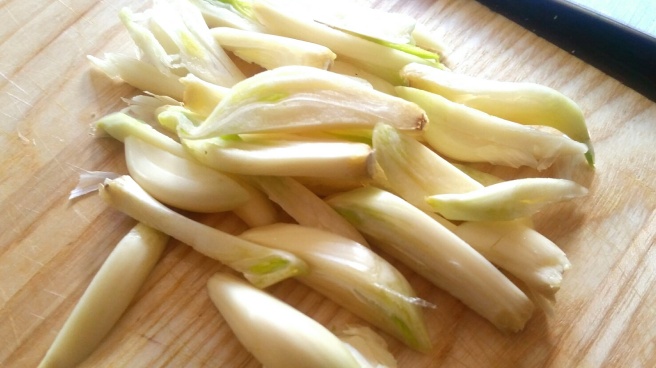
Chop the walnuts and toast them in a dry non-stick pan until they brown and you can smell their nutty scent. Set aside.
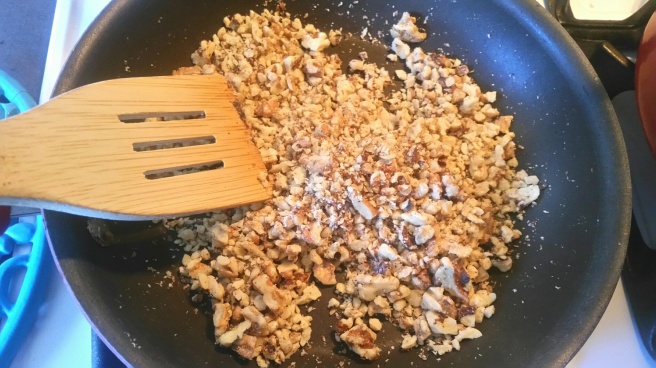
In the same pan, add olive oil and saute the garlic cloves for up to 10 minutes.
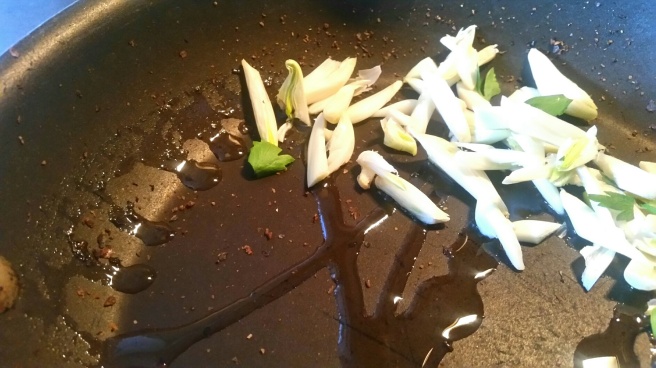
Chop the anchovies and add them to the garlic and oil. Cook on medium low until they begin to melt and break down.
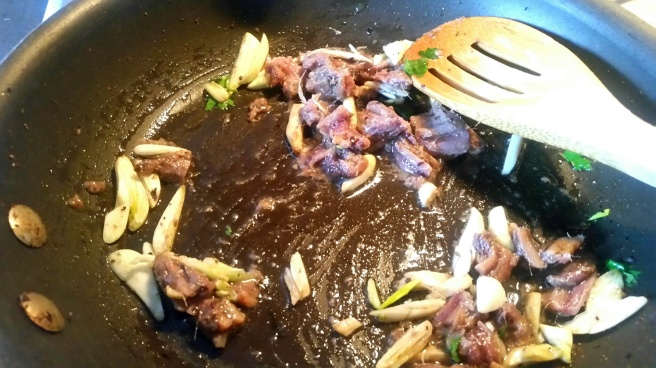
Drain the pasta and reserve one cupful of the cooking water.

Add the cooled walnuts and some of the chopped parsley to the anchovies and garlic, and add in a bit of the pasta water, which helps the sauce thicken and amalgamate, due to the starches released during boiling.
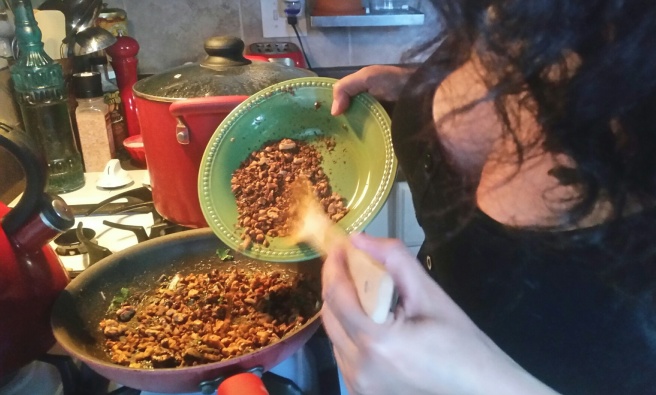
Grate in the Pecorino Romano cheese, add in the lemon juice, stir, then take a tongful (yes, that’s a word, I just invented it) of pasta and add it to the sauce in the pan, doing that cool twirly motion that all the best Italian chefs make look so very easy.

Cook another couple of minutes, just to make sure the cheese melts, then serve. WOW! The anchovy, lemon, parsley, walnuts and cheese are such an amazing combination. Please try this, if only to challenge your preconceived notions about anchovies.


I hadn’t realized that I’ve missed so many of your recent posts – I think I need an email notification because I don’t open up wp reader every day.
Anyhoo, I’ve had this book for a couple of years but have to crack it open. I bought it because I like the idea of learning history via non-traditional themes.
Salads and pizzas are the only foods I’ve enjoyed anchovies in but you make this pasta dish look irresistible.
LikeLiked by 1 person
You’re so kind. Thank you! It was, for the most part, an interesting read, though the science parts were kind of dull for me. But the food history and anecdotes were so amazing. The dish is excellent if you make it! Also, I’ve commented on some of your posts as well but haven’t gotten a confirmation that they went through, so just letting you know. I loved your 2-part post on Black Men Reading! So amazing!
LikeLiked by 1 person
Thank you! FYI: comments on my site are always “held in moderation” until released for not being spammy or offensive. But all of your comments have come through, and I replied to them. I just let Reggie know that he is free to respond as well if he wants to. As always, thanks for engaging!
LikeLiked by 1 person
Loved your review and recipe as usual, Vanessa! I’m sort of a salt freak lol. It’s so vital though. I use it in my baths almost daily, in our water softener, and I even have a salt lamp in my room. I’ve recently cooked with black salt which was a neat experience. Anyhow, I have to read this book! It sounds so educational. 🙂 Thanks for sharing. ❤
LikeLiked by 1 person
I hear you about salt. Salty treats are my weakness as opposed to sweets. I also use salt to make body scrubs – works well with aloe vera oil or even just plain old olive oil in a pinch. It’s excellent for scrubbing out cast iron pans, and I recently tried brining pork chops and they were awesome. So yes, salt is a little-appreciated but very important part of our culinary and historical cultures. The book itself is good, for the most part, though like any similar type of book, there were parts that bored me and I skipped over. But the foodie history and cooking methods were fascinating. Glad you liked it!
LikeLike
that is a fantastic book. Good pick!
LikeLiked by 1 person
Yes, for the most part, I definitely enjoyed it. Excellent food history!
LikeLiked by 1 person
I’ve actually heard things about “salt” before. I’m glad you read it so you can tell me about it and I don’t have to. 😉😉.
I love that you brought up people who freak out about anchovies. I want to ask those people of they’ve ever had ceasar salads, because chances are they’ve had anchovy!
LikeLiked by 1 person
That’s what I do, I read the book so others don’t have to. The history tidbits were interesting, but like I said in the blog post, the science of It kind of lost me. But the different methods of cooking and how salt has been used to preserve food over the centuries is so fascinating. And thank you for agreeing with me about anchovies. Seriously, if I run across another person who freaks out without having ever tasted one, I might smack them.
LikeLiked by 1 person
This sounds so good Vanessa 👌
LikeLiked by 1 person
Thank you! It came out delicious!
LikeLike
Another tasty dish. Oh, and the food looks good, too.
LikeLiked by 1 person
Thank you, kind sir. Glad you like the post. 😉
LikeLike
Best Kurlansky book evah!!! Yay Salt…and garum and soy sauce and salt slides and caves and Tabasco production and all of it.
LikeLiked by 1 person
You were the one who recommended this book to me, so I really should dedicate this blog post to you. Very enjoyable read and got some great cooking inspiration out of it.
LikeLike